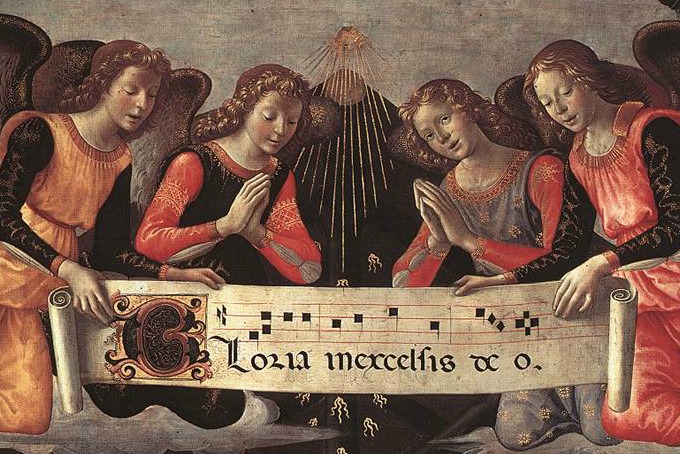And suddenly there was with the angel a multitude of the heavenly host, praising God and saying, “Glory to God in the highest and on earth peace to those on whom his favor rests.” (Lk 2: 13–14)
In the celebration of the liturgy, the Glory to God occupies a unique place. On the one hand, it is a response: we have just participated in the Penitential Act by recalling and confessing our sinfulness as individuals and as a worshiping community, and we have just heard the priest pronounce the concluding blessing “in which the forgiveness of sins is given.” The only response that makes any sense in the face of such a gift is to cry out “Glory to God in the highest.” On the other hand, the Glory to God is also an anticipation: we are poised on the verge of the Liturgy of the Word and the Liturgy of the Eucharist, in which we proclaim in Scripture and enact in ritual the mysteries of God’s saving work in Jesus Christ in such a way that those mysteries—and indeed Jesus Christ himself—become present here and now by the power of the Holy Spirit. We praise God for the marvelous work that has been accomplished in Christ, and that will be accomplished during this liturgy.
And how do we even begin to articulate this praise? By joining our voices to those of the angels. In their exultant hymn to the unsuspecting shepherds on that first Christmas night, the angels themselves taught us how to respond to the saving work of God—by bursting into song and using every synonym we can think of to express our love and gratitude: “We praise you, we bless you, we adore you, we glorify you, we give you thanks for your great glory.” And yet, we acknowledge that, unlike the angels, we stand in constant need of God’s mercy, and so we also voice this need in varied ways by appealing to Jesus Christ, the Only Begotten Son, the “Lamb of God who takes away the sins of the world” (Jn 1:29): “You take away the sins of the world, have mercy on us; you take away the sins of the world; receive our prayer; you are seated at the right hand of the Father, have mercy on us.” We conclude our hymn by paying homage to the triune God, recalling that all three Persons of the Trinity are constantly at work not only in the events of creation and salvation, but that the Father, Son, and Holy Spirit are also present and active in every celebration of the liturgy.
Another way in which the Glory to God is unique in the liturgy is the fact that we refrain from singing it during the penitential seasons of Advent and Lent. As Jeremy Driscoll, OSB explains in his book What Happens at Mass, this is so that “it can ring out with fresh vigor on the feasts for which these seasons prepare us” (26). Indeed, this is especially true of the Evening Mass of the Lord’s Supper on Holy Thursday and the Easter Vigil, when we not only sing the Glory to God for the first time after the long Lenten season, but we also ring bells for the entirety of the hymn. May our joy in singing God’s praises never wane here on earth, and may we one day know the joy of singing God’s glory with the choirs of angels in heaven.



